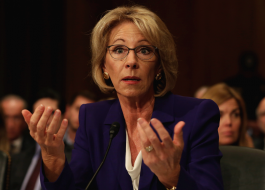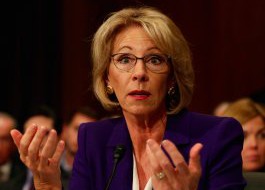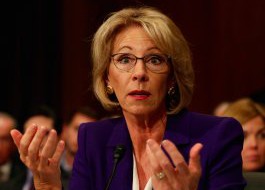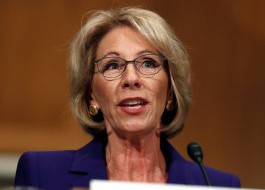 Betsy DeVos.Chip Somodevilla/Getty Images
Betsy DeVos.Chip Somodevilla/Getty Images
The fight over Betsy DeVos' nomination to be education secretary — just barely approved by the Senate with the tiebreaking help of Vice President Mike Pence — has, in the public debate, been mostly a fight over K-12 education policy.
I find the intensity of feeling on both sides about DeVos' views on K-12 a little baffling, given the limited role the federal government plays in K-12 education and the apparently similar results studies have shown are produced by traditional public and charter schools. Contrary to the hopes of her fans and the fears of her detractors, this is not an area where DeVos is likely to have a large effect on education outcomes.
When I worry about the Trump-DeVos Education Department, I worry about higher education, an area where the federal government plays a much larger policy role than in K-12.
By making rules about what higher-education institutions can rely on federal grants and loans to pay their students' tuition, the department plays an important role in ensuring that students and taxpayers get good value for their money spent on higher education. The Obama administration has been aggressive in this area, including forcing the closure of some scammy for-profit colleges.
President Donald Trump, of course, is the ex-proprietor of a scammy for-profit "university." One of his close advisers on education, Jerry Falwell Jr., is the president of a large, low-quality, nonprofit university with a major online component.
Given these associations, I do not have great confidence in Trump's Education Department to focus on ensuring that colleges deliver value in exchange for tuition. Failing to do so would be costly both to students and to the taxpayers, who would be on the hook for grants and defaulted loans to students.
This isn't an area where I think DeVos is likely to have especially nefarious instincts — but her hearing also did not generate confidence that it is an area where she would have especially good instincts either.
I will be watching her Education Department mostly to see whether it allows higher-education scams to run rampant.
This column does not necessarily reflect the opinion of Business Insider.




